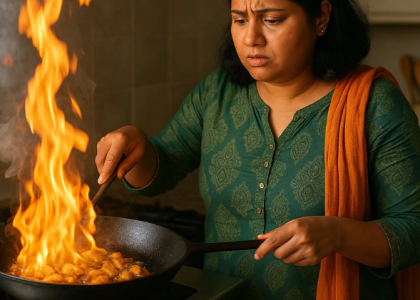Many people in Kerala and other parts of South Asia have been using coconut oil for generations. Lately, some say it’s good for your heart because it raises something called “good cholesterol” (HDL) and lowers blood fats called triglycerides. But is this really true? Let’s look at what science actually tells us.
What Are HDL and Triglycerides?
First, let’s understand what these words mean:
HDL (High-Density Lipoprotein): This is often called “good cholesterol.” Think of HDL as tiny cleaning trucks in your blood that pick up bad cholesterol and take it to your liver where it can be removed from your body.
Triglycerides: These are fats in your blood that come from the food you eat. When you eat, your body converts extra calories it doesn’t need right away into triglycerides and stores them in your fat cells.
What the Research Shows About Coconut Oil
Scientists have done many studies to see how coconut oil affects our blood. Here’s what they found:
About HDL (Good Cholesterol)
Yes, coconut oil does seem to raise HDL (good cholesterol) levels. In fact, several studies show that when people consume coconut oil, their HDL levels go up slightly. One study found that virgin coconut oil increased HDL more than butter or olive oil.
But here’s something important to know: Just because something raises HDL doesn’t automatically mean it’s good for your heart.
About Triglycerides (Blood Fats)
The results are mixed when it comes to triglycerides:
- Some studies show coconut oil might slightly lower triglycerides
- Other studies found no change in triglycerides
- Some research even showed increased triglycerides with coconut oil
Most recent large reviews of many studies suggest that coconut oil doesn’t have a significant effect on triglycerides for most people.
The Bigger Picture: What This Means for Your Heart
Here’s something very important that many people don’t realize: Raising HDL alone doesn’t mean your heart is protected.
Scientists used to think that anything that raised HDL would automatically protect your heart. But newer research shows it’s not that simple. In fact, some medicines that raised HDL a lot didn’t actually prevent heart attacks.
Even more concerning is that coconut oil also raises LDL (bad cholesterol). Most studies show that coconut oil increases both HDL and LDL cholesterol compared to vegetable oils like sunflower or olive oil.
What Should You Do?
If coconut oil is part of your traditional cooking, you don’t need to completely stop using it. But here are some sensible steps:
- Use coconut oil in moderation – not for all your cooking
- Mix up your oils – use olive oil, mustard oil, or other vegetable oils for some of your cooking
- Don’t believe claims that coconut oil is a “heart superfood” – the science doesn’t support this
- Talk to your doctor especially if you have heart problems or high cholesterol
The Bottom Line
Coconut oil does raise HDL (good cholesterol), but it also raises LDL (bad cholesterol). Its effects on triglycerides are mild or neutral for most people. Most importantly, raising HDL alone isn’t enough to protect your heart.
Remember: No single food is a miracle cure. A balanced diet with plenty of vegetables, whole grains, fruits, and moderate fats is still the best approach for heart health.
References
- The Effect of Coconut Oil Consumption on Cardiovascular Risk Factors. Circulation. Link
- Coconut oil and cardiovascular risk factors in humans. Nutrition Reviews. Link
- Daily Consumption of Virgin Coconut Oil Increases High-Density Lipoprotein Cholesterol Levels in Healthy Volunteers. PMC. Link
- Randomised trial of coconut oil, olive oil or butter on blood lipids and other cardiovascular risk factors in healthy men and women. BMJ Open. Link
- Coconut Oil – The Nutrition Source. Harvard T.H. Chan School of Public Health. Link
- Coconut Oil and Cardiovascular Disease Risk. Current Atherosclerosis Reports. Link




